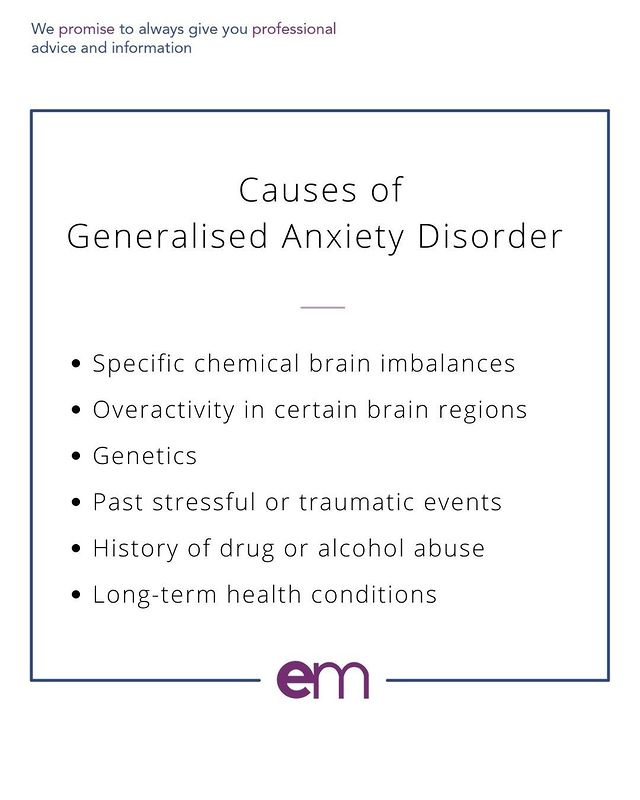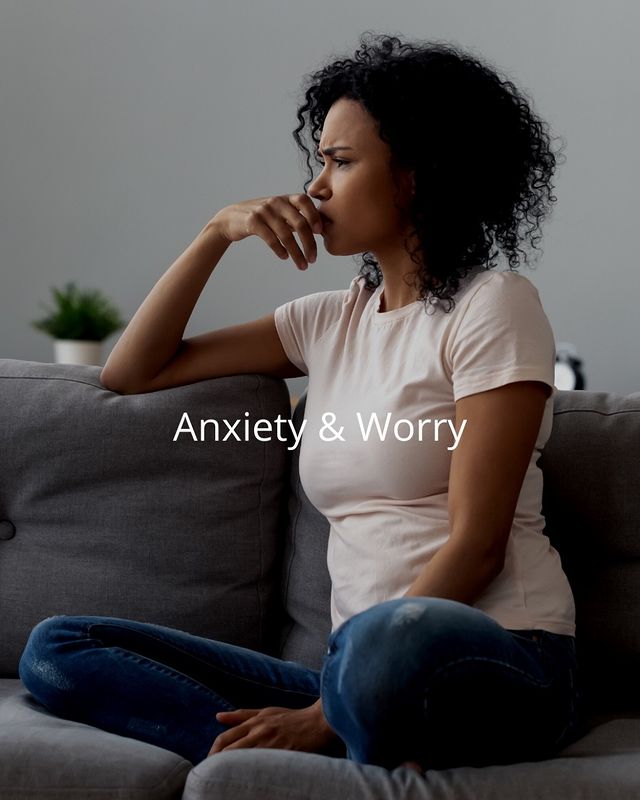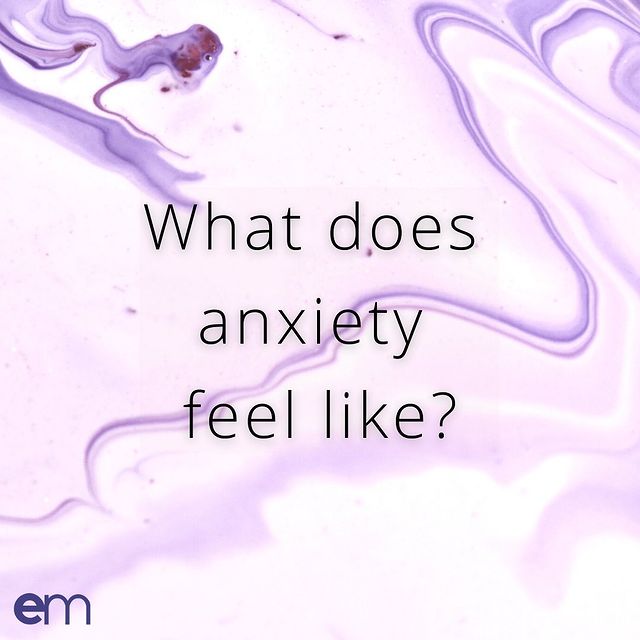WHAT IS ANXIETY?
Anxiety refers to the experience of excessive and uncontrollable worry in certain situations.
Anxiety can affect us in different ways, from influencing our thoughts and feelings to causing physiological arousal.
On this page, you can find out more about different ways you might experience anxiety and how anxiety treatment can help you develop healthy coping mechanisms and improve your wellbeing.
WHAT IS ANXIETY LIKE?
People often describe anxiety as a condition that takes over your head space, getting you caught up in overthinking and overanalyzing every aspect of your life, from the important things to the insignificant details.
It can feel like you’re carrying a very heavy burden on your shoulders, but you may feel ashamed to talk about how much you’re genuinely struggling because you fear that others will judge you and think you’re being over-dramatic.
Anxiety is debilitating. Your mind is constantly on fire and your thoughts move in a million different directions at once. This can keep you awake at night, and make it hard sometimes to even take a breath. Although your body feels exhausted, your mind feels wide awake and running.
Anxiety can also trigger emotional eating and binge drinking as a way of numbing your emotions. It can feel safer to struggle with your anxiety, than to face feelings that you fear may be too overwhelming.
SUPPORTING CHILDREN’S MENTAL HEALTH
This month we are launching our new online therapy and counselling services for teenage children.
We provide support for both children and their parents.
Your Voice Matters
BOOK A CALL WITH OUR FRIENDLY ASSESSMENT TEAM
Choose a day and time that works for you.
Tell us what is going for you.
Let us explain how we can help.
WHAT ARE ANXIETY SYMPTOMS?
There are different ways you might experience anxiety.
Below is a list of anxiety symptoms that can affect your mind and body.
- Feeling nervous and unable to relax
- Increased heart rate
- Uncontrollable worry and fear
- Mind racing and feelings of dread
- Intrusive thoughts
- Insomnia
- Headaches or feeling light-headed and dizzy
- Panic attacks
WHAT ARE THE DIFFERENT ANXIETY DISORDERS?
There are different types of anxiety disorders, and below is a list of some that you may identify with.
Generalised Anxiety Disorder (GAD)
This type of anxiety is non-specific, and can affect any part of your life. It is one of the most common types of anxiety disorder.
You may experience a general uneasiness, or uncontrollable worry about a wide range of situations, including work, family, money and relationships.
Sometimes there may not be one obvious cause for your anxiety, but many everyday experiences that feel overwhelming on a daily basis.
Panic Attacks
Panic attacks are intense physiological reactions to an episode of uncontrollable fear and worry. These may be recurrent, lasting between 5 – 20 minutes.
You may experience a rapid heart rate, shaking, sweating, chest pain and faintness. These experiences can be very frightening, as you may feel as though you are having a heart attack.
Sometimes the fear of having a panic attack can increase the likelihood of having a panic attack in the future.
You may experience uncontrollable worry when thinking about panic attacks, and this can send your sympathetic nervous system into overdrive.
Health Anxiety
You may experience anxiety and worry around health and illness. You may worry that you or your loved one will develop a serious medical condition, and these fears can affect your daily functioning.
You may try and cope with these worries by frequently checking your body for signs of illness, or making frequent visits to the doctor even when they say that you are healthy.
You may experience anxiety symptoms, such as headaches and increased heart rate, and these experiences themselves may promote anxious thoughts about your health.
Social Anxiety
Social anxiety is characterised by anxiety and worry in social situations. You may fear judgement from others, and worry that you may act in an awkward or embarrassing way.
Social Anxiety is something many people experience, so we have created it’s own page on our website here.
Feel Well
If you are interested in our services, arrange a call with our friendly team.
We want to understand what is going on for you, so we can match you with the right practitioner.
We value being clear and open about our prices, so please check Our Fees before booking a call.
ANXIETY TREATMENT AT EMOTIONMATTERS
Anxiety is a condition that can negatively affect so many areas of your life, and requires targeted anxiety treatment.
There are many different types of anxiety therapy available at EmotionMatters, working with both your mind and body for a complete anxiety treatment.
Anxiety counselling can help you find healthy ways to cope with your current distressing psychological and physiological symptoms. Counsellors may use different tools and techniques to help you manage your anxiety.
Cognitive Behavioural Therapy can help you understand how your thoughts, behaviours and emotions interact to worsen your anxiety symptoms.
We will explore what triggers your anxiety, teach you skills to challenge your thinking and show you tools to help relieve your physical symptoms.
Anxiety therapy can help you delve deeper into the underlying root cause for your anxiety and help you improve your wellbeing.
During the initial stage of therapy you will learn new coping skills to help you alleviate your physical symptoms of anxiety.
As anxiety therapy progresses we look to identify the inner struggles underlying your anxiety, and support you in building new healthy patterns for managing and coping with life and relationships.
Psychiatric treatment for anxiety may include a combination of medical and psychological interventions to help reduce your anxiety.
Our psychiatrist can provide diagnostic assessment, psychiatric coaching and prescribe anti-anxiety medication to help you reduce physical symptoms and modify your response to triggers.
Balanced nutrition plays an important role in reducing anxiety. Our nutrition team will help you create an eating and lifestyle plan to calm your mind and body, give you greater vitality, and help you balance your hormones.
Our MindHealth programme combines psychological and nutritional interventions, to help you improve your wellbeing and reduce your anxiety.
This holistic approach is our gold standard for anxiety treatment.
Feel Well
Tell us what is going on for you, and let us explain how we can help
ANXIETY SELF-HELP NOW
You may not be ready to talk to us yet, so here are some self-help strategies that can help you reduce your anxiety symptoms:
- Opening up to someone you trust can be a relief and help you better understand your worries and anxiety.
- Look after your physical health by getting enough sleep and following a balanced diet that can stabilise your mood and energy levels.
- Regular exercise will help you battle stress and release tension, as your brain releases endorphins which will improve your mood.
- Breathing exercises, mindfulness and relaxation techniques will help calm your mind.
- Keep a diary of the situations that make you feel anxious and note how you’ve reacted in each situation. This will help you identify potential triggers for your anxiety.
- Avoid things that can exacerbate your anxiety, such as smoking, caffeine and alcohol.
Learn more about Anxiety
Here are some articles and blogs about anxiety







